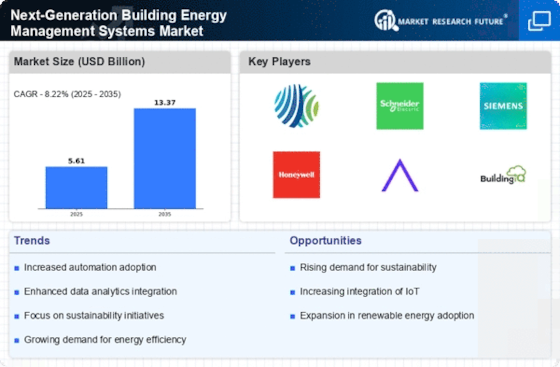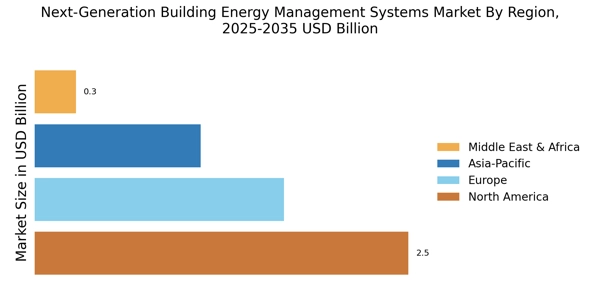Rising Energy Costs
Rising energy costs are a significant driver influencing the Next-Generation Building Energy Management Systems Market. As energy prices continue to escalate, building owners and managers are increasingly seeking solutions to mitigate these expenses. Advanced energy management systems enable organizations to monitor their energy consumption closely and identify inefficiencies. Reports indicate that businesses implementing these systems can achieve energy savings of 10 to 20%, which translates into substantial cost reductions. This financial incentive is likely to drive the adoption of next-generation systems, as stakeholders aim to enhance their bottom line while maintaining operational efficiency.
Increased Focus on Sustainability
The heightened focus on sustainability is a crucial driver for the Next-Generation Building Energy Management Systems Market. As environmental concerns gain prominence, organizations are compelled to adopt energy-efficient practices. Building energy management systems play a vital role in reducing carbon footprints by optimizing energy usage and integrating renewable energy sources. The market is witnessing a shift towards systems that not only comply with sustainability standards but also promote green building certifications. This trend is expected to accelerate the growth of the Next-Generation Building Energy Management Systems Market, as more entities prioritize eco-friendly solutions.
Growing Demand for Smart Buildings
The growing demand for smart buildings is a prominent driver of the Next-Generation Building Energy Management Systems Market. As urbanization accelerates, there is an increasing need for buildings that utilize technology to enhance occupant comfort and operational efficiency. Smart buildings leverage advanced energy management systems to automate processes such as lighting, heating, and cooling, resulting in optimized energy consumption. Market analysis suggests that the smart building sector is projected to grow substantially, with energy management systems being a core component. This trend indicates a robust future for the Next-Generation Building Energy Management Systems Market as it aligns with the broader shift towards intelligent infrastructure.
Government Regulations and Incentives
Government regulations and incentives are increasingly shaping the landscape of the Next-Generation Building Energy Management Systems Market. Many governments are implementing stringent energy efficiency standards and offering financial incentives for adopting advanced energy management solutions. These policies encourage building owners to invest in technologies that enhance energy performance. For example, tax credits and rebates for energy-efficient upgrades can significantly lower the initial investment barrier. As regulatory frameworks evolve, they are likely to stimulate demand for next-generation systems, thereby fostering growth in the market.
Integration of IoT and AI Technologies
The integration of Internet of Things (IoT) and Artificial Intelligence (AI) technologies is a pivotal driver for the Next-Generation Building Energy Management Systems Market. These technologies facilitate real-time monitoring and control of energy consumption, leading to enhanced operational efficiency. For instance, AI algorithms can analyze vast amounts of data from various sensors to optimize energy usage patterns. According to recent estimates, the adoption of IoT in building management could lead to energy savings of up to 30%. This trend not only reduces operational costs but also aligns with the growing demand for smart buildings, thereby propelling the Next-Generation Building Energy Management Systems Market forward.

















